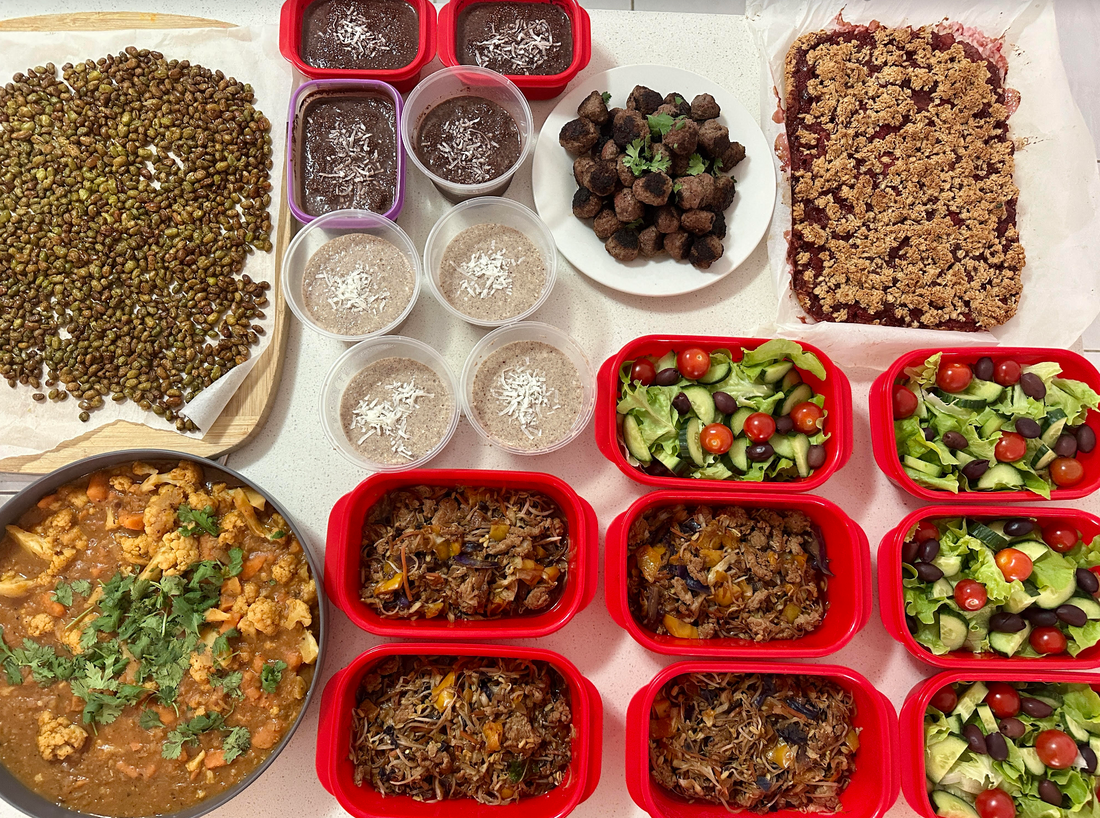
Why am I not losing weight and menopause weight loss
Not losing weight despite eating a low-calorie, low-carb, and high-protein diet can be frustrating, especially when you're exercising regularly.
However, there are several factors to consider, particularly during menopause. Let's break down some possible reasons and what you can do to address them.
P.S if you need a menopause diet plan then check out our menopause meal plan in our membership

1. Hormonal Changes During Menopause
In menopause, hormonal changes can play a significant role in how your body responds to diet and exercise. Lower estrogen levels can make it harder to lose weight, particularly around the midsection. Estrogen influences how your body stores fat and impacts insulin sensitivity. A drop in estrogen may increase fat storage and make it harder to burn fat, even if you’re eating fewer calories.
Solution: Focus on balancing your hormones through a combination of diet, stress management, and targeted exercises. Include foods rich in phytoestrogens (like flaxseeds, tofu, and lentils) to support hormonal balance.
2. Calorie Intake May Be Too Low
if you are eating a low calorie diet, your intake may be too low, especially if you’re exercising regularly. A very low-calorie diet can put your body into "starvation mode," where it holds onto fat because it senses that it isn’t getting enough energy. This is particularly true for women in menopause whose metabolism may have slowed down.
Solution: Try increasing your calorie intake slightly focusing on nutrient-dense, whole foods. This can help prevent metabolic slowdown and ensure you’re getting enough energy to support your workouts.
Try our meal plans in our membership

3. Water Retention and Inflammation
Low-carb diets often lead to initial water loss, but the body may compensate by retaining water, especially if your electrolyte balance is off. Additionally, menopause can increase inflammation in the body, which can also lead to water retention and mask fat loss on the scale.
Solution: Make sure you're drinking enough water and include foods rich in potassium (like leafy greens and avocados) to help balance electrolytes. Consider adding anti-inflammatory foods like turmeric and ginger to your diet.
4. Muscle Gain vs. Fat Loss
If you’ve been focusing on high-protein intake and exercising, you might be building muscle while losing fat. Muscle is denser than fat, so even if you’re losing inches, the scale might not show a change initially. This is common, especially if you’re doing resistance or strength training.
Solution: Instead of relying solely on the scale, track your progress through body measurements or how your clothes fit. You may notice positive changes even if the number on the scale stays the same.
5. Stress and Cortisol Levels
Menopause can increase stress levels, and higher cortisol (the stress hormone) can contribute to weight gain, particularly around the belly. Chronic stress can also increase cravings for sugary or high-carb foods, which can affect your overall calorie balance.
Solution: Incorporate stress-management techniques such as yoga, meditation, or deep breathing exercises. Even a 10-minute daily practice can help lower cortisol levels and support weight loss efforts.
6. Thyroid Function
Your thyroid regulates metabolism, and thyroid issues are more common in women during menopause. An underactive thyroid (hypothyroidism) can slow down your metabolism, making it harder to lose weight despite dieting and exercise.
Solution: If you suspect thyroid issues, consider getting a full thyroid panel test with your doctor. Ensuring you get enough iodine, selenium, and zinc in your diet can support thyroid function.
7. Inaccurate Calorie Tracking
Sometimes, we underestimate the number of calories we consume or overestimate the calories burned during exercise. Even healthy foods like nuts, seeds, and oils can add up quickly in calories if portions are not controlled.
Solution: Use a food tracking app for a few days to double-check your calorie intake and ensure you’re accurately measuring portion sizes. Be mindful of hidden calories in dressings, sauces, or snacks.

What to Do Next:
- Adjust Your Calories: Slightly increase your intake to 1300-1500 calories and see if this helps.
- Focus on Fibre: Increase your fiber intake (aim for at least 25-30g per day) to support gut health, which is crucial during menopause.
- Track Non-Scale Victories: Pay attention to changes in measurements, energy levels, and how your clothes fit.
- Get Your Hormones Checked: If weight loss continues to be challenging, consider checking your thyroid and hormone levels with your doctor.
- Practice Patience: Remember that menopause can make weight loss slower, but consistent efforts will eventually pay off.
If you continue to struggle, it might be helpful to work with a nutritionist or health coach who understands menopause and can tailor a plan to your specific needs.
Keep focusing on overall health rather than just the scale, and be kind to yourself during this hormonal transition.


